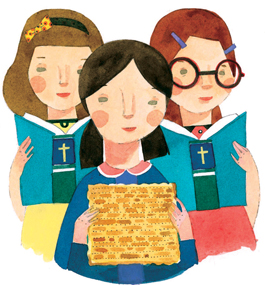Turning Points
Matzo Matters

Jennifer Corace
by Allie Morse ’10
When I asked the boys on the playground at my elementary school to pass me the basketball, I expected resistance stemming from the usual complaint: Girls have cooties!
Instead, a dozen pairs of mournful and entirely earnest eyes fixed on me. “Why’d you have to go and kill Jesus?” one boy said.
Kids battle for territory every day on the playground, jockeying for position, using put-downs as currency. When you’re a member of a minority — be it religious, ethnic or racial — the teasing can rub especially raw. So often these taunts come from deeply held prejudices that are parroted, without reservation or any kind of understanding, by children who hear them at home.
I was raised in Forsyth County, Ga., which is known for three things. It’s the birthplace of “Hee Haw” comedian Junior Samples. It’s been the fastest-growing county in the U.S. for half a decade. And it has a bone-crushing history of racism. On an infamous 1987 “Oprah” episode, Forsyth County residents were filmed as they openly sputtered racial animosity against a backdrop of KKK marches and Confederate flag-waving rallies.
When my Jewish interfaith family, including two kids under 2, moved to Forsyth County from Massachusetts, my parents assumed our new home would be as welcoming as the Southern-hospitality stereotype promised. It was 1990, after all. Unfortunately, pitchers of sweet tea were sometimes served with a side of ignorance.
Every holiday season at our house, to honor my dad’s Christian background, we put a Christmas tree next to the menorah. It was not until I was 6 and had to sing an unfamiliar song about a “manger” for a school performance that I realized not everyone celebrates Christmas and Hanukkah.
I had only the vaguest sense of what religion is. My formal Jewish education came from a 1970s-era Jewish encyclopedia, one of my mom’s bat mitzvah gifts, and Ask Jeeves. My vivid imagination filled in the expansive gaps. I knew I believed something different from what most of my school friends believed, but why and how those differences were important remained hazy.
Well-meaning teachers prepared lessons about Jewish holidays so I wouldn’t feel left out. My mom would send me to school with matzo, and I’d tell the story of Passover or sing “The Dreidel Song.” The goal of these classroom moments was to remove some of the mystery, but what they really did was make sure that every last one of my classmates knew I was different. I was the first real-life person of a different faith many of my peers had ever met. The stories they’d heard about Jews were often fractured and always without context. Simplified versions of the Crucifixion story painted me as a clear enemy.
The summer after second grade, a friend invited me to a vacation Bible school at her church. After we recited Bible verses and bedazzled crown magnets, the youth pastor called me into his office alone. Unless we were “saved,” he said, my family and I would suffer eternal damnation. No gory detail was spared.
With all the indignation a 9-year-old can muster, I told him Jews did not believe in hell. I offered a disapproving rebuttal, punctuated with an eye roll, to each of his points. I was genuinely shocked a grown-up could not understand that we just believed different things. I didn’t think he was a bad person because we disagreed on matters of faith. Why did he think I was bad?
Later, the other girls at the Bible school begged me to save myself. My annoyance mounting, I informed them that their suggestions were, in fact, putting my life at risk. Yom Kippur was coming, and that was when G-d opened his Book of Life and struck bad little Jewish boys and girls down dead (an understanding I had cobbled together and was completely convinced was true).
I do not remember if I was asked not to come back because I made the girls cry (which I did). Whatever the reason, I did not return to vacation Bible school.
Growing up Jewish in an adversarial environment only solidified my identity and gave me a deeper understanding of tikkun olam. We can’t repair the world without repairing ourselves first, and addressing why we look askew at people who think differently than we do.
A lofty, difficult goal. But I’m not shy about grabbing the low-hanging fruit along the way. As a grown-up, I am never without a comeback to “Why did you have to kill Jesus?”
Allie Morse is the digital content and social media specialist in the university’s Office of Communications.
